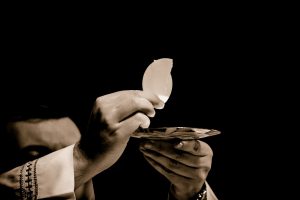How many times a year do Catholics have to come to Mass? 54 times: Every Sunday plus Christmas and the Solemnity of Mary, Mother of God (January 1). Now, for some of us, it’s the most important moment of our week and a rich spiritual experience! For others, it’s an average experience, while for some, it’s boring.
However, if I said there was a way to have a richer experience of Mass, would we be open? I think so, because the human person desires to learn and grow.
Therefore, we’re going to reflect on today’s Gospel, about the multiplication of loaves and fish, which foreshadows the Eucharist. There are four parts in the event that concern our expectations of Mass and our attitude during Mass. If we understand these four parts, they will benefit us 54 times a year!
1) In the Gospel, after the people had eaten, it says that they were “satisfied” (Jn 6:12). “This is the only time in John’s Gospel that we are ever informed of people’s satisfaction”(Bishop Daniel Mueggenborg, Come Follow Me, 223). So, when we celebrate Mass, we’re supposed to be satisfied—but with what kind of satisfaction? Not at the level of having fun or of emotions, but something much deeper.
One time there was a young woman at my church who posted photos on Instagram of herself drunk at a party and dressed in an immodest way. When her friends saw the photos, they were shocked and she was embarrassed. When I learned about it, I knew she must have been feeling very badly, so I called her and said, “I found out what happened. Look, we all make mistakes. Don’t worry, I don’t think less of you, because I’ve done stupid things. I know you’re an incredible person, so my opinion of you hasn’t changed. Just go to Confession and put it in the past.” You know what she said? “Fr. Justin, you’ve made my month.” Now usually someone says, “You’ve made my day.” Going to a party, having a good meal, doing something fun can make our day.
However, small things, when they come from God, can make our month: An act of kindness, a hug, a compliment, a word of encouragement. What Jesus is telling us from the Gospel is that He can satisfy us with very little. He took just five loaves and two fish and fed 5,000. 
At Mass, He takes bread and transubstantiates it into His body, and that can satisfy us! When we hear God’s Word at Mass, one idea can satisfy us! (By the way, we’ll explain the word ‘transubstantiate’ on Aug. 19.)
Do you remember in Lord of the Rings there’s a special kind of bread? Legolas holds up a square piece of it and says, “Lembas! Elvish way bread. One small bit is enough to fill the stomach of a grown man.” 
J.R.R. Tolkien, the author, who was deeply Catholic and made Lord of the Rings a Catholic novel, was drawing on the power of the Eucharist to satisfy our souls.
So, what do we expect during Mass? We should expect Jesus to give us spiritual satisfaction.
Please watch this 5-minute video about finding a deeper satisfaction. It’s from a documentary called “Desire of the Everlasting Hills,” concerning three people who have same-sex attraction, and how God called them to a beautiful life with Him. One of the individuals, Paul, talks about how he lived a wild life, but it led him nowhere. Notice at the end how he cries when he talks about receiving the Eucharist.
2) Let’s specify this spiritual satisfaction. In the Gospel, Jesus feeds the people with bread. Scott Hahn says that, when we pray the Our Father we say, “Give us this day our daily bread,” not our daily steak (Understanding the Lord’s Prayer, Track 12). Why? Because bread satisfies our hunger, but doesn’t always taste incredible. God gives us bread to take care of our needs, not our wants. A good father doesn’t give his children everything they want—that would be counterproductive for them. A good father gives his children what they need.
There are some Masses where I’m totally distracted because of things in my life, fatigue, or the celebration of Mass is poor. But every time I receive Jesus in the Eucharist, He satisfies my needs. I sometimes still feel burdened with problems, but I always get what I need: love, strength, and peace.
3) Let’s talk about our attitude at Mass. In the Gospel, what kind of bread did the boy offer Jesus? Barley bread. Barley bread is the food of the poor (Fr. Raymond Brown, The Gospel According to John I-XII, 233). What does that tell us? We need to approach Mass with humility.
Humility, first of all, means faith in Jesus. Let me ask you: Do you believe Jesus can do miracles? Even if some of us don’t believe that the Eucharist is actually Jesus’ Body and Blood, do we believe He could make it so if He wanted to? I ask because Mass will only satisfy us if we come to it with humility and faith. Humble people are also open, and so are always ready to receive what God wants to give them. There are some people who are so open that, no matter how unprepared the homily or music is, they always receive something.
The opposite of humility is pride—be careful of this. We men typically struggle with pride: We resist what Jesus teaches us, we resist what we hear, and we’re disagreeable. I also notice that some of us, sometimes, come to Mass angry—those who are observant can detect it. I see a number of teenagers come to Mass carrying anger, and when we’re angry, we’re closed and don’t receive. We need to take the path of humility, openness and forgiveness.
4) In the Gospel, there are two words used for ‘sight’: 1) It says that the “multitude followed Jesus because they saw the signs He performed… They may have seen the signs, but they did not understand what those signs meant” (Come Follow Me, 219). The Greek word (Eoron) to describe their sight means a superficial seeing. 2) But the Gospel uses a different word for Jesus. When Jesus “saw” the crowd, the word used (Theasamenos) indicates that He had insight.
So, when we celebrate Mass, we’re supposed to see signs that point to a deeper reality (Cf. CCC 1075). For example, the priest is a sign of …? Christ. Why vestments? Sign of heavenly robes. The lectors’ proclaiming God’s Word is a sign of Jesus’ preaching to us. The choir singing is a sign of the angels and saints singing in heaven. When Christ died, it was on a Cross, in a bloody way; but, at Mass, it’s the exact same event of Jesus’ offering Himself to the Father—how? Under the form of signs. When the priest raises the paten with the Eucharist on it, to the Father, the gesture reminds us that we’re actually offering Jesus to the Father.
If we ever stop going to Mass because the homily or music is poor or because someone was rude to us, then we’re just seeing signs; our faith isn’t yet mature. Yes, these signs are important: We should celebrate Mass in such a way that people have a taste of heaven. The servers, Deacon, and I have to be precise and reverent because this is sacred worship. The choir has to choose beautiful music and sing at a high level. The lectors and gift presenters have to dress up (men in suits, women in whatever is the equivalent). The Hospitality Team has to love people as Christ does. Please hold us to high standards. And, if you’re new here, thank you for coming; I hope our celebration helps you to pray. However, if the signs are lacking, that shouldn’t shake our faith.
And here’s my request for the whole parish: If we’re going to be truly centered on the Eucharist, which is to what God is calling us, please be on time for Mass, and don’t leave until the servers and I have exited. I know being on time is difficult, and I have struggled with this my whole life, and we all have reasons why we’re late. Nevertheless, just because it’s hard doesn’t mean we should lower our standards or stop trying. For myself, I’m inviting you to hold me to a higher standard.
Now let’s be specific: When does Mass start? When it says, for instance, 5:00 p.m., it means 5:00 p.m. In the seminary, we had to be at morning meditation at 6:00 a.m., and one guy asked P. Augustine, “Father, if I arrive at 6:01, am I late?” Father said, “If your train is scheduled to depart at 6:00 and leaves at 6:00, and you arrive at 6:01, are you late?”
When does Mass end? When we’ve stopped singing the final hymn (not including the organ flourish). I know people have heard differently, but we, as a parish, are establishing a standard here: The final hymn is a prayer, so we’re not going to leave until the prayer is over. Yes, the servers and I process out, but we’re still praying while moving.
According to a famous story, when one man left Mass early, St. Philip Neri sent two servers with candlesticks to follow him through the streets of Rome. He was so irritated that he went back to St. Philip and asked why, to which the saintly priest responded: “It is to pay proper respect to Our Lord, whom you are carrying away with you. Since you neglect to adore Him, I sent the servers to take your place.” (I’m honestly thinking about doing this.) The point is, when we receive Jesus, we become living tabernacles, and so we need to act more Christ-like.
We have to realize what coming late and leaving early communicates to our kids: This pattern tells them that Mass isn’t important. But that’s not who we are: We aspire to make the Eucharist the centre of our lives.
We now have a few ways to improve our experience of Mass and help others do so 54 times a year: Come on time, don’t leave early. And, if we come to Mass with humility, faith and openness, and look to what the signs mean, then Jesus will satisfy our spiritual needs.

